5. Two New Teammates
So Osawa-san latched onto some new ideas, Takeuchi-san did the art, and Yone-san, the music. Rhythm Paradise’s degree of completion had jumped up. Then, after this prolonged struggle, two new members joined the team.Thank you for waiting, Masaoka-san and Seki-san. What did each of you work on?
I was mostly in charge of programming. I worked on several of the main minigames and additional frills. I also wrote some programs related to the menu.
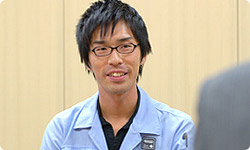
I was in charge of graphics. I worked on characters and 2-D and 3-D art. I also created some visuals for the menu.
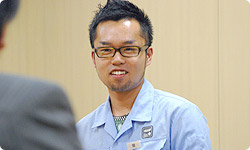
When did you join the team?
About one year ago.
What was your impression of the project at that time?
Well, I had always been a big fan of Rhythm Tengoku. The day it was released, I bought it and got stuck right in. I was overjoyed to join the team. Before that, I had been working alone on the test model for another project, but working alone isn’t very satisfying. Then I joined this team, and my enthusiasm level suddenly shot up. I loved the way everyone was going full steam ahead and were completely absorbed in what they were doing.
Everyone was moving forward with their eyes fixed firmly on Osawa-san.
Yes. It was like Osawa-san was a pillar around which their feverish activity was centred. I’m not sure how to best put it. My spirits were constantly on high.
Without any confusion?
That’s right. When I joined the team, Osawa-san had already laid down the main components, so with that as a basis, I could turn out whatever came to mind. I was blessed with a good development environment.
You’re not so bad at laying down such a foundation yourself.
Yeah. I love making a game’s underlying framework. (laughs)
But at that time, the more you did, the more it took shape. That must have been exhilarating.
Yes. Both activities are fun, but at that time I wanted to prioritise giving one thing after the next definite form, so I enjoyed it.
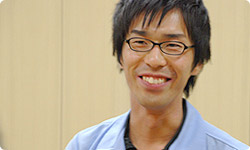
How about you, Seki-san?
When I joined the team, someone who knew about the development of the Game Boy Advance version said something about how if only a couple of the minigames I made got used, I should consider myself lucky.
Ahh, I see. When we made Rhythm Tengoku for the Game Boy Advance, a large number of the individual rhythm games got rejected. Even if one was well-made, the theme was rhythm, so if it didn’t feel right, the whole thing had to go. So what that person said was true in that sense.
Yeah. But at first I was worried.
About whether your rhythm games would be used.
Yes. (laughs) Then when I joined the team and started working with everyone, I began to worry about it less and less. It was more fun enjoying the game with everyone. I became more and more absorbed in it.
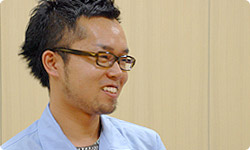
I see. It’s interesting that you have both said you were “absorbed” in it. I don’t hear that too much from other development teams. I wonder why that is.
I think it’s because we had so much fun making it. This game is really simple, so as we were making it, there was hardly any aspect that wasn’t directly connected to what’s fun about the game. As I was working on it, I would arrive at parts that made me think, “Oh, this is fun!” very quickly.
Ahh, I see, I see. There weren’t any times when you had to tell yourself to just bear with it because you’d eventually get to the fun part.
Yes, exactly. I would write the program, then turn around and start playing it, so there was an immediate reward. Of course, not everything turned out perfect. Some parts turned out awful.
In any case, that immediate reward worked in the game’s favour. Was there anything that you liked but Osawa-san said was no good?
Well, he didn’t exactly say it wasn’t any good, but...
He doesn’t say it, but you can tell he’s thinking it?
When he thinks something is fun, he says so, so you know. When he likes it, his reaction is clear and simple.
But when there’s no reaction?
Then there’s not much of a response.
(laughs)
When he does show a reaction, he’ll turn away and say, “Oh, this is fun,” sort of under his breath right before he walks away. When you hear that, you know you’ve done well. You rejoice after he’s left. When he drops a few words like that, they’re laden with meaning and give you confidence.
Yes, that’s right. (laughs)
Really, you guys are a splendid team! (laughs)
...
(laughs)
(laughs)
How did it appear to you, Takeuchi-san? Did the two new guys easily adapt to the team?
Yes. It was almost like there were no boundaries between us.
Hmm, why do you think that was?
They’re both valuable in their own right, but a big underlying factor was that Osawa-san explained everything to them thoroughly. When the five of us gathered for our first meeting, Osawa-san set forth how we were going to make the game. That sure made me happy!
(laughs)
...
I thought, “Wow, he’s turning into a true director. He’s grown up!” (laughs)
I see. (laughs)
Part of their value lies in that they listened quietly to his advice and endeavoured to soak up how we felt about the project, without any ifs, ands or buts. That’s why this team got along so well. (laughs)
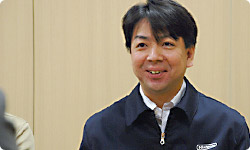
How nice. How did it seem to you, Yone-san?
I have to agree that they blended right in without any fuss. Well, at first, when Masaoka-kun showed something he’d made to Osawa-san, he got the usual, “Hmm...” response, and you could see the perplexity on his face (laughs), but they’re both good at realising what’s required of them, so it wasn’t long before their ideas integrated. That’s why I was so impressed when, after a little time had passed, they started making something with the unique atmosphere of the original Rhythm Tengoku.
Oh, is that so? That must have been the result of them having loved the first one and played it so much.
I do think that’s a big part of it. I played that thing to death! (laughs)
